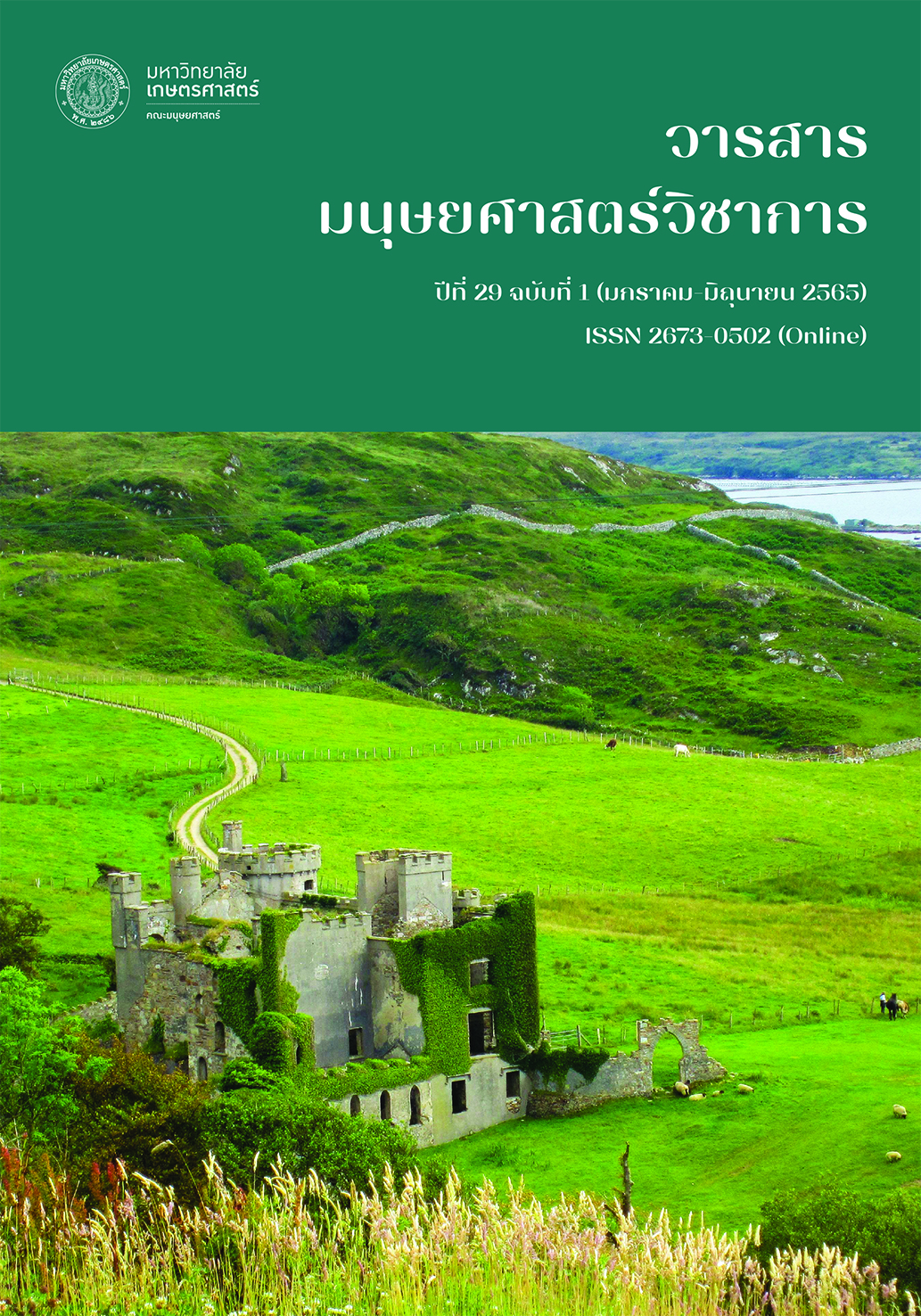The Study of the Doctrine and Belief of Zhuang People in Liao Songs of Pingguo District, Baise City, Guangxi Province, China
Main Article Content
Abstract
The objective of this research is to study the Doctrine and Belief of the Zhuang people that appear in Liao Songs of Phingkua District, Bai Se City, Guangxi Zhuang Autonomous Region, People’s Republic of China. Researchers have collected and translated books “Liao Songs of Pingguo Zhuang” consisting of 5 books by Luo Hantian, based on document research and implemented in 5 steps, namely 1) data collection 2) data translation 3) Data validation 4) Data analysis and 5) Data presentation.
The results showed that doctrine and beliefs of the Zhuang people that appear in Liao Songs of Pingguo Zhuang, there are 4 aspects: 1) Doctrine and beliefs of the Zhuang people, which consist of “Me” doctrine and “Shi gong” doctrine, Moderator of “Me” Doctrine serves to expel ghosts from people who are sick, while Moderator of “Shi gong” Doctrine pray to release the souls of the dead to their happinessat the funeral, and choose auspicious time for special occasion. 2) Beliefs about gods and angels, which consist of Descent Goddess, Cycle of birth and death God, Fireplace God, Door guard God and Land god. 3) Beliefs about ancestral spirits, that Zhuang people pay close attention to the offerings of ancestral spirits in important festivals, and in the event that the Zhuang people consider it important to their lives. 4) Beliefs about ghosts, Zhuang people believe that there are many types of ghosts, the appearance of a ghost often unattractive and ugly, and character is cruel, all that cause the Zhuang people to feel fear of ghosts. The result of the study of the Doctrine and Belief of Zhuang People in Liao Songs of Pingguo District, Baise City, Guangxi Province, China, in addition to informing the Liao Songs culture that is the identity of Zhuang ethnic group in Guangxi and the doctrine that the people of Zhuang have inherited for a long time, is also the dissemination of Zhuang culture for Thais to know more deeply, as well as promoting cultural tourism in the following order.
Article Details

This work is licensed under a Creative Commons Attribution-NonCommercial-NoDerivatives 4.0 International License.
References
Caiji, L. (2014). A Study of the Belief in Kitchen God of Zhuang Nationality. Journal of Young writer, 29(26), 175.
Guangyong, H. (2018). On the religion structure of black clothes Zhuang nationality in Fu’ning Yunnan. Journal of Wenshan University, 32(2), 44-47.
Haibo, L. (2003). Dialogue between secular and sacred: Research on folk Kitchen God faith and legend (Doctoral Dissertation). East China Normal University, Shanghai.
Hantian, L. (2009). Liao songs of Pingguo Zhuang. Beijing: Ethnic Publishing House.
Hui, C. (2007). A comparative study of ritual about local god of the land between Zhuang people and Tai people: Taking Laiba Village of Wuming in Guangxi and Mianxiang Village of Chiangmai in Thailand as an example (Master’s Thesis). Guangxi University for Nationalities, Nanning.
Jinwen, C. (2008). Goddess Yah vuengz in Zhuang’s local beliefs: Discuss with Professor Satang Liang Thingwang. Review of Social Sciences, 5(4), 35-39.
Lan, C. & Lihao, C. (1991). An Analysis on the Folk Customs of the “March Three” Festival. Journal of Guizhou Ethnic Studies, 12(1), 67-71.
Lianzhi, L. (2018). On female characters in Zhuang’s belief and economic and cultural
development in Zhuang region. Wenjiaoziliao, 46(1), 69-71.
Qiuwei, Z. (2015). Research on the Belief in Reproduction of Zhuang nationality: A case study on the Faithfulness of Ganyu Village (Master’s Thesis). Guangxi Teachers Education University, Nanning.
Shengmin, Q. (2003). A comparative study of Zhuang and Thai national traditional culture. Nanning: Guangxi People’s Publishing House.
Siying, L. (2013). The “dukngwk” worship of the Dong-Tai group and Its remains from the oral tradition. Proceedings of the 16th Annual Meeting of the Chinese Baiyue Ethnic History Research Association (December 3, 2013). Guangzhou: China Baiyue Ethnic History Research Association.
Xian’an, C. (2006). An analysis of Zhuang’s Mo religion. Journal of Religion and Nationality, 4(4), 251-260.
Xiqiang, W. & Cailuan, Q. (2001). Religious beliefs in Zhuang’s house culture. Guangxi Ethnics Studies, 16(2), 55-63.
Yan, H. & Zhiqi, Y. (2017). A study of the Luo Yue cultural inheritance of the Zhuang people in China, the Dai people and the Nong people in Vietnam. Journal of Nanning Normal University (Philosophy and Social Sciences Edition), 37(3), 122-127.
Yongxian, Q. (2017). The Study of beliefs and rituals about “Huapo” of Dai People: The case study of Dai People in Dehong. Journal of Guangxi Normal University for Nationalities, 34(5), 20-23.
Youzheng, M. (2009). The study on comparing the Zhuangs’ Mo religion and the Zhuangs’ Shi religion. Study of Ethnics in Guangxi, 24(2), 113-120.
Zhensheng, Q. (1994). Research on Zhuang nationality’s flower totem. Academic Forum. 16(1), 58-63.


